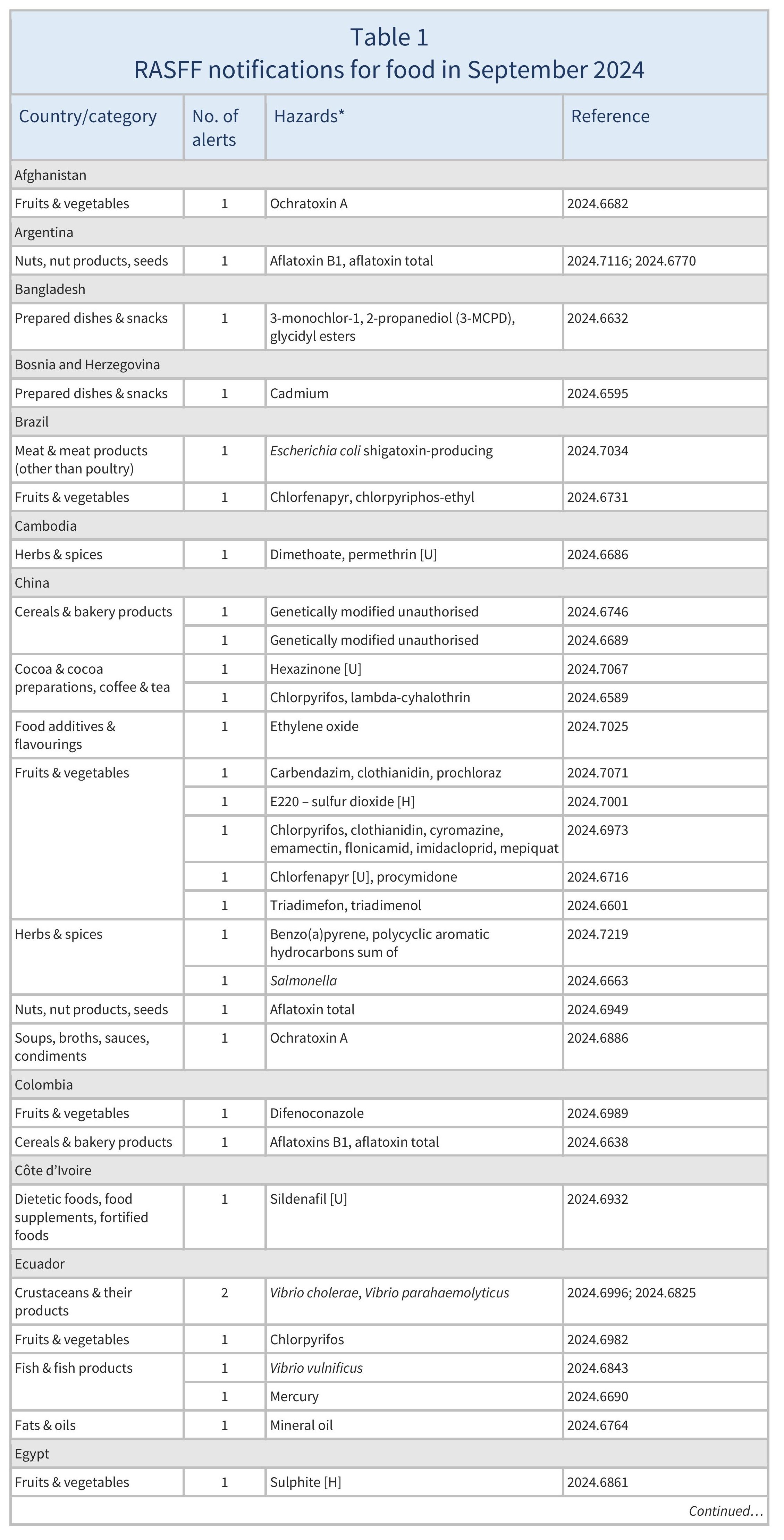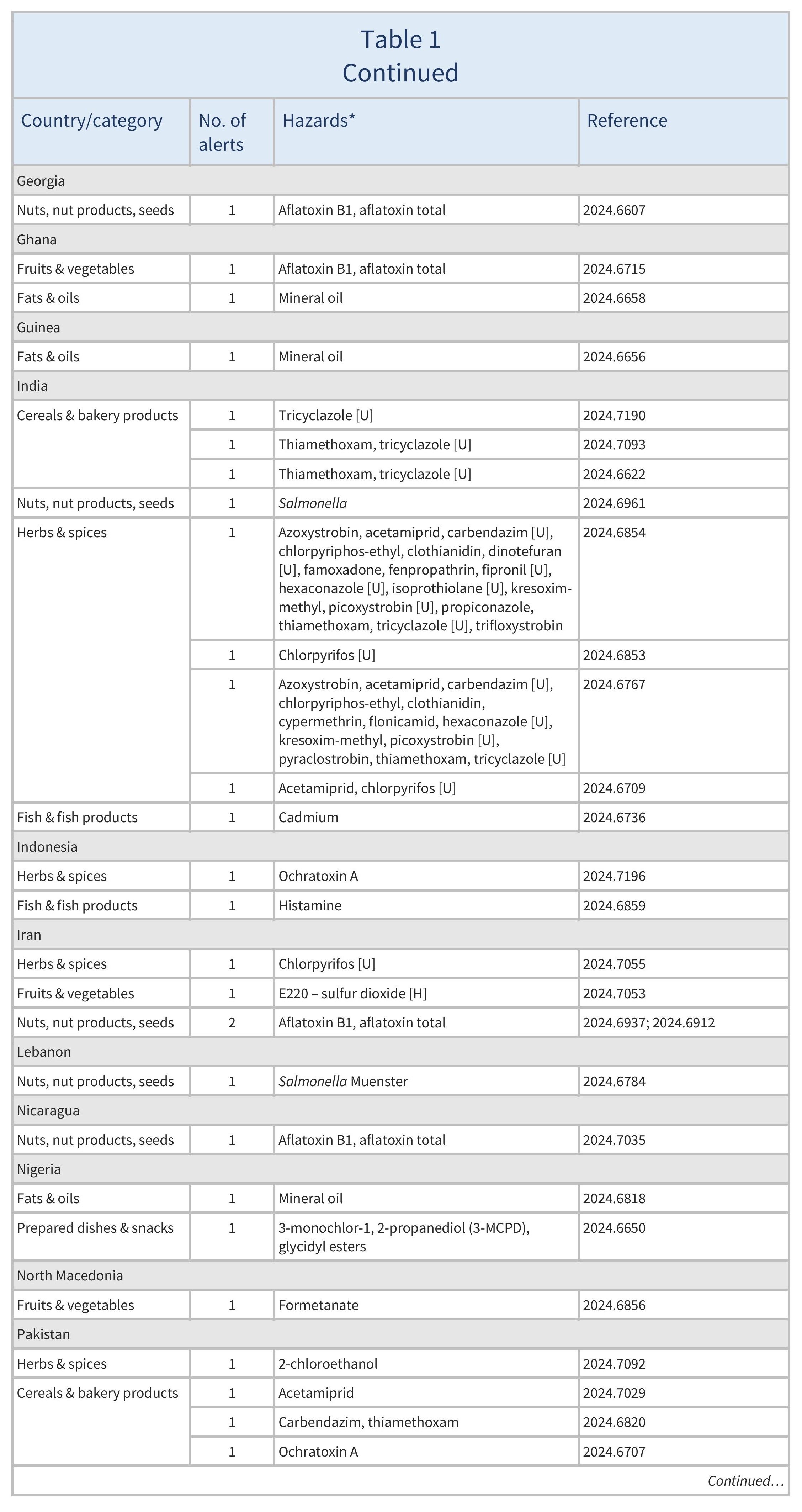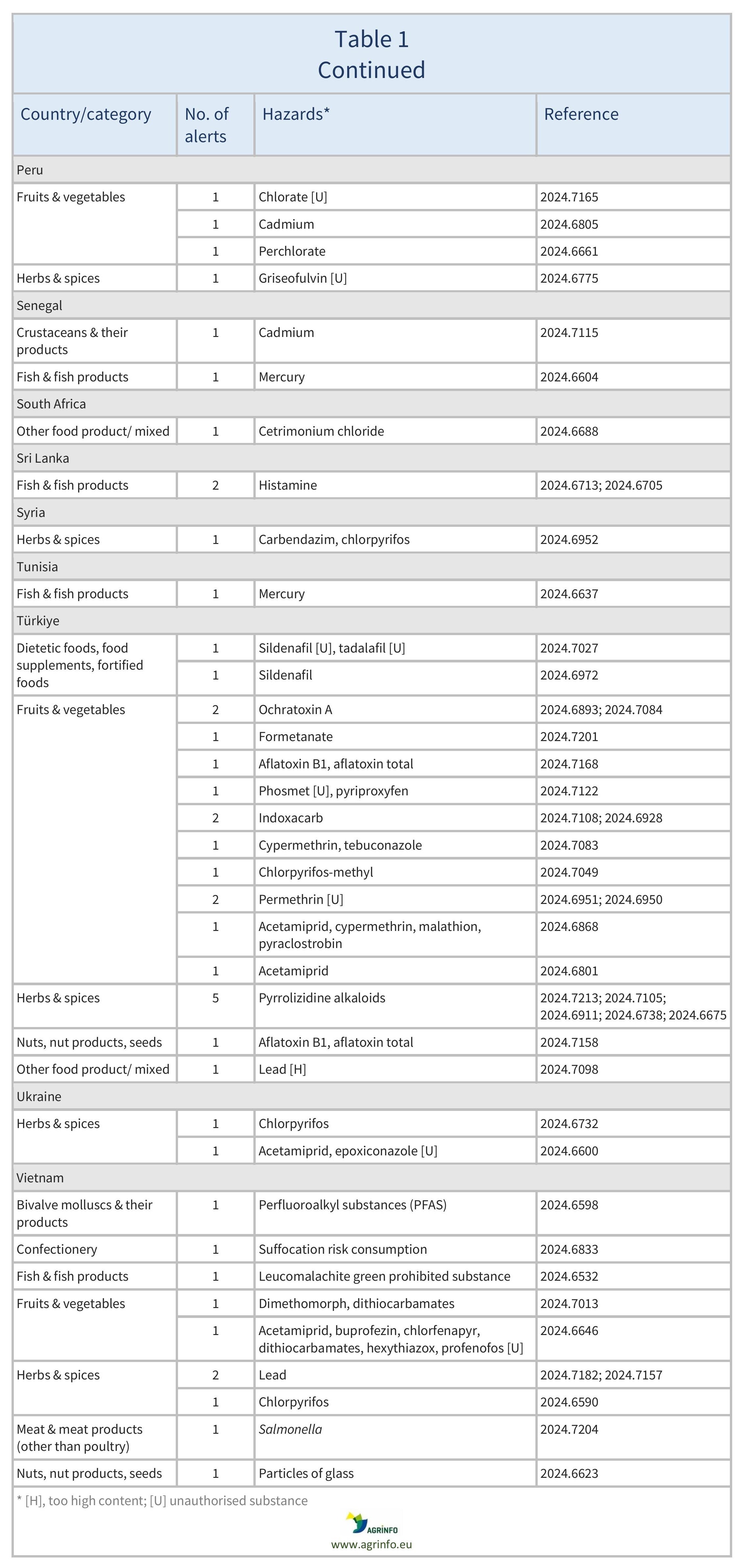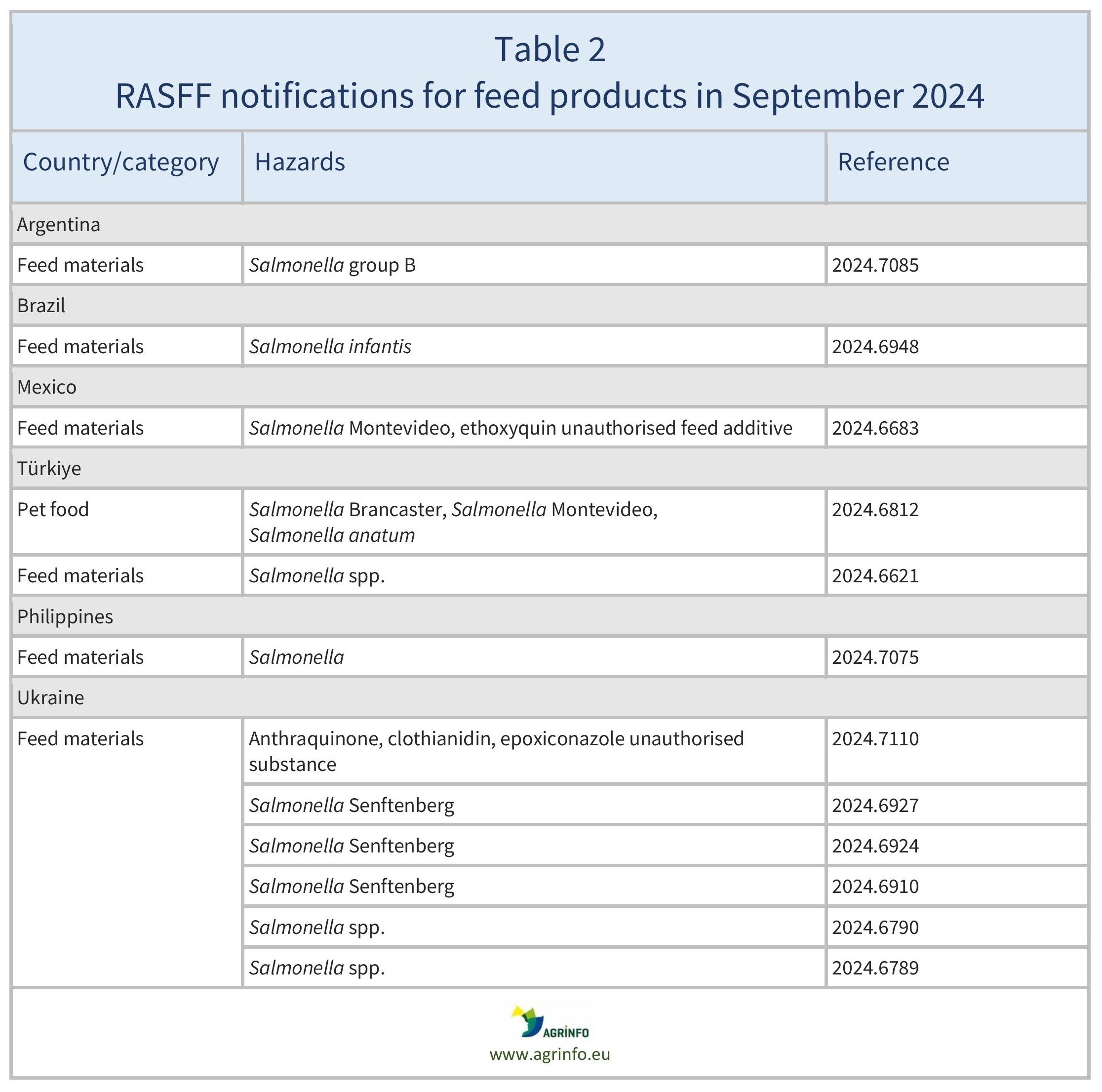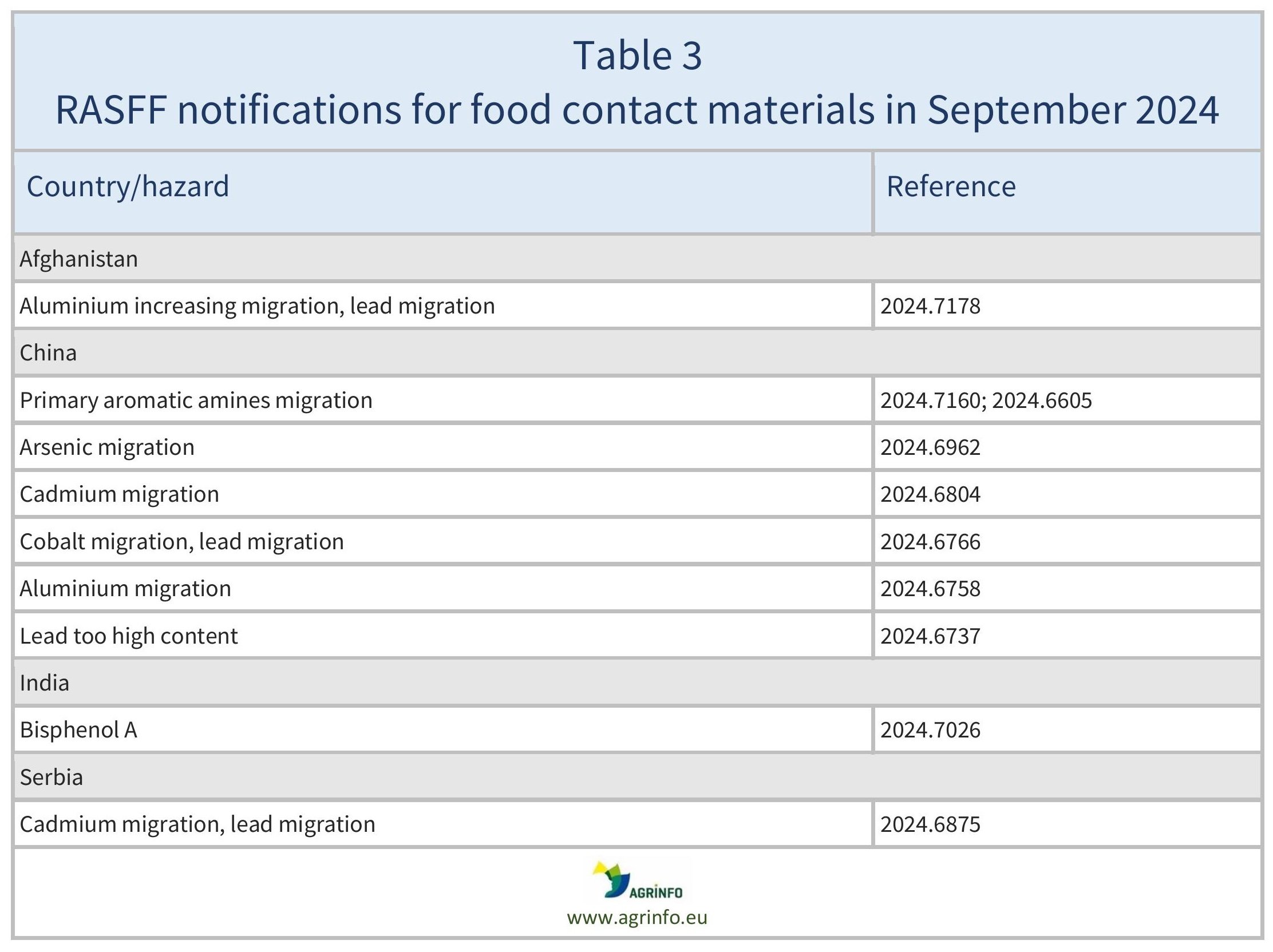RASFF notifications in September 2024
- Official controls
Summary
This report summarises Rapid Alert System for Food and Feed (RASFF) notifications of products entering the European Union from low- and middle-income countries, that occurred in September 2024:
- 104 notifications on food products
- 12 notifications on feed
- 10 notifications on food contact materials
originating from 34 AGRINFO partner countries.
34 AGRINFO partner countries received RASFF notifications in September 2024
Update
This report summarises Rapid Alert System for Food and Feed (RASFF) notifications of products entering the European Union from low- and middle-income countries, that occurred in September 2024:
- 104 notifications on food products
- 12 notifications on feed
- 10 notifications on food contact materials
originating from 34 AGRINFO partner countries.
September 2024 RASFF notifications
Food products
One hundred and four notifications on food products originating from 31 AGRINFO partner countries (Table 1).
Feed products
Twelve notifications on feed entering the EU from Argentina, Brazil, Mexico, Philippines, Türkiye, and Ukraine (Table 2).
Food contact materials
Ten notifications on food contact materials originating from Afghanistan, China, India, and Serbia (Table 3).
For more detail on these notifications, see the European Commission’s RASFF Window using the references given in Tables 1–3.
Timeline
RASFF notifications in September 2024.
What are the major implications for exporting countries?
RASFF notifications can have significant implications for producers and exporters. Notified food products may need to be recalled from the market or destroyed to prevent them from being sold and consumed. This can result in financial losses for producers, exporters, and other parties involved in the supply chain. Furthermore, if there are several interceptions due to contamination – by mycotoxins including aflatoxins, pesticide residues, pentachlorophenol and dioxins, microbiological contamination, Sudan dyes, Rhodamine B, and plant toxins – these can lead to increased controls and other measures. See Temporary increased official controls on food from certain countries.
Recommended Actions
To minimise RASFF notifications and ensure smooth trade with the EU market, producers and exporters from non-EU countries must take action to ensure the safety of their products. This involves implementing rigorous control measures at every stage of production, processing, and packaging to ensure adherence to EU standards and regulations; establishing comprehensive food safety management systems (such as Hazard Analysis and Critical Control Points – HACCP) to identify and address potential risks across the supply chain; and maintaining meticulous documentation of all activities to enable traceability and provide evidence of compliance with EU regulations.
Background
The Rapid Alert System for Food and Feed (RASFF) was set up to allow EU food safety authorities to rapidly exchange information on health risks from food or feed, enabling them to take immediate action to avert the risk. RASFF provides a round-the-clock service to ensure that urgent notifications are sent, received, and responded to collectively and efficiently. Information exchanged through RASFF can lead to products being recalled from the EU market, averting risks before they can cause harm, from farm to fork.
The European Commission must inform non-EU countries if an exported product is subject to a notification, so that the country’s authorities and exporters can take corrective measures.
The legal basis for RASFF is set out in Art. 50 of the EU General Food Law (Regulation 178/2002).
For further information see Official Controls Regulation – explained.
Sources
RASFF Window (consulted 22 October 2024)
Tables & Figures
Disclaimer: Under no circumstances shall COLEAD be liable for any loss, damage, liability or expense incurred or suffered that is claimed to have resulted from the use of information available on this website or any link to external sites. The use of the website is at the user’s sole risk and responsibility. This information platform was created and maintained with the financial support of the European Union. Its contents do not, however, reflect the views of the European Union.
34 AGRINFO partner countries received RASFF notifications in September 2024
RASFF Window (consulted 22 October 2024)
What is changing and why?
This report summarises Rapid Alert System for Food and Feed (RASFF) notifications of products entering the European Union from low- and middle-income countries in September 2024:
- 104 notifications on food products
- 12 notifications on feed
- 10 notifications on food contact materials
originating from 34 AGRINFO partner countries.
See Tables 1–3.
Actions
To minimise RASFF notifications and ensure smooth trade with the EU market, producers and exporters from non-EU countries must take action to ensure the safety of their products. This involves implementing rigorous control measures at every stage of production, processing, and packaging to ensure adherence to EU standards and regulations; establishing comprehensive food safety management systems (such as Hazard Analysis and Critical Control Points – HACCP) to identify and address potential risks across the supply chain; and maintaining meticulous documentation of all activities to enable traceability and provide evidence of compliance with EU regulations.
Timeline
RASFF notifications in September 2024.
Tables & Figures
Disclaimer: Under no circumstances shall COLEAD be liable for any loss, damage, liability or expense incurred or suffered that is claimed to have resulted from the use of information available on this website or any link to external sites. The use of the website is at the user’s sole risk and responsibility. This information platform was created and maintained with the financial support of the European Union. Its contents do not, however, reflect the views of the European Union.

